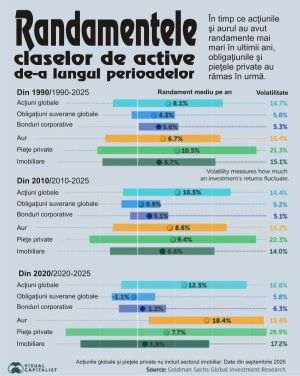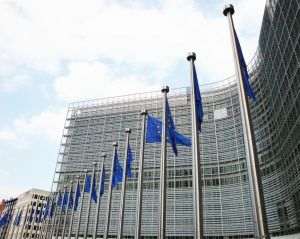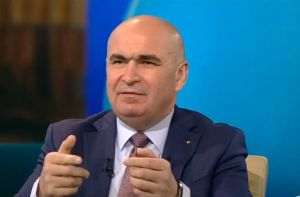Reporter: How do you characterize our financial market compared to those in the region?
Dan Maşut: The financial services market is an essential pillar of the economy, adapted to the moment a country is in, and Romania in recent years has experienced significant transformations driven by technological progress, changing customer expectations, and evolving regulations.
Romania continues to be a country with a high percentage of cash payments, but the digital payment market offers numerous opportunities. Our goal as a provider of digital payment solutions is to play a transformative role in this direction and contribute to the digitalization of the local business environment. Currently, in Romania, only 30% of payments are made by card. In Turkey, on the other hand, where Token Financial Technologies (TOKEN) is the market leader, over 70% of payments are made by card.
Reporter: How do you characterize the way consumers respond to the rapid digitization of the economy?
Dan Maşut: Romania's digital development has begun and is irreversible, and the acceleration of the process depends mainly on the services that the business and governmental environment will offer. The emergence of digital technologies has propelled the business environment into a new era of comfort and accessibility, and consumers' response is specific to a tech-savvy generation.
In general, companies use digital solutions to streamline processes and improve customer experience. Specifically, in the financial market, companies allow customers to access their accounts, perform transactions, and manage their finances remotely. It is evident that attention has shifted to the consumer, hence one of the prominent payment trends in recent years being the widespread adoption of contactless and mobile payments. Mobile wallet applications allow users to securely store their payment information and make transactions with a simple tap.
Reporter: How educated do you consider customers in Romania to be, on a scale of 1 to 10, regarding online financial operations?
Dan Maşut: Romania remains a country where cash is the preferred payment method. It is evident that the adoption of online financial operations is primarily the prerogative of younger generations, as far as end-users are concerned. In this sense, a barometer of the field is the e-commerce sector, which has grown unprecedentedly since 2020. Online shopping platforms, regardless of size, have adopted digital payment methods as a means to improve customer experience and increase sales. The integration of secure payment options has expanded consumer choices and facilitated cashless transactions, providing an added level of confidence in the collective mindset, where, however, there is a normal reluctance to change.
In the business environment, online operations will accelerate as the state expands its range of digital services. e-Invoicing is one of the initiatives which, although criticized by many, we believe will ultimately bring more transparency to the business environment and contribute to reducing tax evasion.
Reporter: What should be done to increase the level of financial education?
Dan Maşut: Although not a trendsetter in the payments field, Romania manages to implement modern technologies, which the general public adopts as they become convinced of the comfort they offer and, above all, the security of transactions.
TOKEN, as a market leader in Turkey, has extensive experience, both as a producer of new technologies and as a provider of payment services, and we aim for the Romanian market to benefit from these advantages of ours. We plan to introduce new, efficient technologies and devices in Romania to support merchants and end consumers and thus contribute to educating the market at all levels.
Reporter: What services do you offer, exactly, and who do you work with?
Dan Maşut: In our portfolio, we offer solutions for every distribution channel and type of user under the Odero brand, the trademark of Token products. For instance, OderoPOS is the transaction management platform and POS devices manufactured within the group, OderoPAY is the online payment acceptance solution, and OderoTAP is the mobile POS.
The POS systems we manage are internally developed - the group has been producing cash registers and payment terminals under the Beko brand since 1985. Our payment terminals are modern, high-performance devices equipped with Android technology, providing stability and increased compatibility. TOKEN has introduced the concept of a one-stop-shop for integrated, secure, fast, and user-friendly digital payment solutions in Romania. Merchants opting for our POS systems will also benefit from the option to use a single payment terminal, thus reducing their business costs. Additionally, payment management will become a straightforward operation, and our teams will ensure maintenance both on-site and remotely.
Recently, we also launched a product dedicated to gas stations: the first self-service cash register OderoPOS. This outdoor payment terminal, incorporating Android 9 technology, allows contactless unassisted payments, thus contributing to streamlining payments and, consequently, attracting more customers.
In addition to POS systems, we also provide support in the e-commerce sector through the OderoPAY online payment platform, offering innovative payment solutions using virtual terminals provided by banks. Beyond the advanced technology and value of our terminals, we possess the expertise that has propelled Token Financial Technologies to the position of a fintech leader in Turkey. In conclusion, we can offer, on one hand, banks, terminals, and infrastructure combined with software expertise, and on the other hand, we can fully take over payment service management for merchants once we receive authorization from the National Bank of Romania.
Reporter: How is Token's activity evolving in the Romanian market?
Dan Maşut: TOKEN has been present in Romania for about a year, during which we have worked intensively on reconfiguring the entire portfolio of IT applications, preparing terminals, and identifying the needs of customers and authorities. Additionally, we are awaiting approval from the National Bank of Romania to become an authorized payment institution, and we have concluded strategic partnerships that support our development strategy. At the same time, we benefit from the support and expertise of our parent company in Turkey, which manages 800,000 active terminals in that market. As for our new team of specialists in Bucharest, together we are oriented towards growth and united by the idea that a digitized Romania is the key to a civilized society.
Reporter: How do you assess the competition in the market?
Dan Maşut: A market with multiple top players is a consumer-oriented market, where complete services make the difference, including the entire range of payment types: card payments, open banking, installment payments, both with credit cards and through Buy Now Pay Later services, etc.
Continuing, in Romania, payment services are mainly offered by banks, a formula that corresponded to the early stage of cashless payment acceptance. However, as technology has significantly contributed to increasing the sophistication of payment services, this activity managed solely by banks has reached its limits. In Turkey, for example, TOKEN hosts bank applications on its terminals and communicates directly with merchant platforms, and transactions are completed much faster - almost instantaneously. For us, in Romania, banks are not competitors; together we can develop complementary services. At the same time, banks could allow us to become more involved in this segment of activity where we have the expertise and infrastructure to take it to the next level, as demanded by merchants, and they could optimize their internal costs by redirecting resources to their core business.
Reporter: What are your expectations for this year?
Dan Maşut: We are very close to obtaining authorization from the NBR; thus, we will become the first non-banking payment institution authorized according to the PSD2-specific regulatory framework - a European directive that produces irreversible changes in the financial services market, to the benefit of consumers and companies. This will allow us to be independent and have our own portfolio of local clients, in which case we will be able to build and calibrate our products to meet the needs of a larger area of beneficiaries. Thus, we will be able to identify unaddressed needs of consumers/merchants and turn them into reliable products. An example would be the possibility for people to access interest-free installments directly from merchants, regardless of the card issuing bank. We aim to contribute to optimizing payment services in Romania and integrating as many applications into digital payment systems as possible, helping merchants manage their businesses more efficiently.
Taking as a model the success of the other two subsidiaries of the Koç group here, Arctic and Ford Craiova, we believe that Token Financial Technologies will also become a trusted player in the digital payment market in Romania. Moreover, our country is the first one outside of Turkey in which TOKEN has chosen to invest, and the experience gained in Romania will offer us the opportunity to expand into other European markets, where the Koç group, the largest private holding in Turkey, already has exposure.
Reporter: Thank you!









































